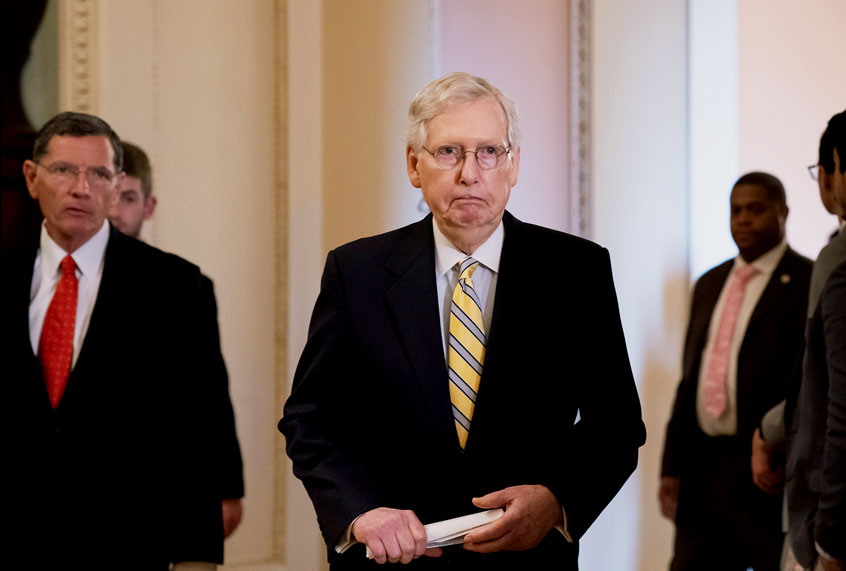Amid grass-roots impeachment gatherings, partisan debates and a seething White House, Donald Trump this week became the third impeached U.S. president.
A lot of people underwent a lot of effort to make things dramatic, but the numbers the House of Representatives vote were understood from the get-go. Then Nancy Pelosi blindsided everyone.
But first, there were last-minute screeds and pleas, and a disclosure. The president’s six-page letter attacking Pelosi and other Democrats did not wave away his dishonor.
Trump agent Rudy Giuliani’s remarks didn’t help. There was a scheme, not a single phone call, he says, to extort a campaign smear to benefit Trump for release of military aid to Ukraine.
After the 230-197, 229-198 partisan votes on two charges, Pelosi shocked everyone. Vowing not to give the Senate the impeachment formalities presently, she said she wants assurance of a fair trial.
So, shortly or not, we think we’re on to the Senate.
Will Chief Justice John G. Roberts Jr. or Senate Majority Leader Mitch McConnell drive the decision-making?
An impartial Senate leader
McConnell, unusually pushy this week, says publicly he is not an impartial juror. He says this is a political, not legal, process. “Everything I do during this, I’m coordinating with the White House counsel,” he says repeatedly, pledging to sway the outcome for acquittal.
Minority Leader Chuck Schumer’s attempts to call additional Trump administration officials are dismissed by McConnell. Schumer wants the likes of the acting chief of staff, Mick Mulvaney, and a former National Security adviser, John R. Bolton, to bolster the case against the president.
We have yet to hear from the chief justice, who normally is a big defender of the independence of the judiciary.
McConnell insists that while Roberts is assigned by the Constitution to preside, it is McConnell who controls majority votes. And those votes will decide on evidence, timing and procedures.
No pushover
Bruce Ackerman in Slate argues more or less what I’ve been suggesting: Roberts probably is no pushover.
Ackerman’s thesis is that the Senate’s own Rules of Procedure and Practice specifies it is the “presiding officer” who “shall direct all forms of the proceedings.” The officer may “rule on all questions of evidence including, but not limited to, questions of relevancy, materiality, and redundancy of evidence.”
That means it should be Roberts, not McConnell, who decides.
Slate says the rules explicitly grant “any member of the Senate” the right to object to Roberts’ evidentiary decisions. If the chief justice stands firm in his opinion, a senator may demand “a vote of the Members of the Senate” on “any such question” with a simple majority sufficient to overturn a ruling.
Strict Senate rules
Still, the Senate majority’s authority is strictly constrained by the very rules it created. While it can reverse particular evidentiary rulings, it can’t bar a witness.
Instead, it is up to the lawyers representing the House and the president to make these critical decisions. There is a proviso that “witnesses shall be examined by one person on behalf of the party producing them, and then cross-examined by one person on the other side.”
Not that Trump will do so, but the rules allow him to testify, subject to cross-examination. A trial would proceed even if the president refuses to participate or even sends his lawyers.
According to Senate rules, “the doors of the Senate shall be kept open” so that the nation can come to its own decision. When all the evidence is in, senators can retire to engage in jury-style deliberations behind closed doors.
The rules go back to the trial of Andrew Johnson in 1868 but were re-enacted by the Senate in 1986.
Still, lawyers say the Senate can waive its own rules by unanimous consent, which happened with former President Bill Clinton.
Says Slate, it would be legal if McConnell persuaded enough Republicans to push through sweeping changes by a bare majority vote. That vote would have to come within a day after presentation of a final House impeachment vote.
Overruling the Senate
Current rules say the “Chief Justice shall be administered the oath ‘to do impartial justice’ and shall preside over the Senate during … the trial of the person impeached.” Once Roberts replaces Vice President Mike Pence as the Senate’s presiding officer, McConnell’s attempt to change the rules would generate a constitutional crisis, reports Slate.
Roberts could refuse to allow the Senate to vote on proposed rule changes that were inconsistent with Roberts’ pledge “to do impartial justice.”
When Roberts takes the gavel, immediately after the bill of impeachment passes to the Senate, will he resist any effort to transform the rules’ demand for an impartial trial into a partisan power play?
Most observers see Roberts as a serious judge, dedicated to sustaining the Supreme Court’s central position in our system of checks and balances. So far, the media coverage and the various remarks by partisan senators have skipped over just how much leeway Roberts will have.
Trial or political event?
Is this a trial or a political event, as McConnell says?
What does Roberts have to say about an impartial event being run as a rigged procedure with assured outcomes?
Will Roberts put the Constitution above bitter partisan conflict?
If Roberts acts powerfully, McConnell could find a new problem herding his simple majority votes on whether to hear from the requested Democratic witnesses, for example, since the majority is pretty slim.
Of course, Roberts would then have to rule on whether Trump defenders could call the whistleblower who put impeachment efforts in motion; or Democrat Joe Biden and son Hunter Biden, who are targeted by Trump for derision; or Giuliani; or others.
Altogether, an activist chief justice could actually make this a trial again instead of a quiet, quick recitation that clears Trump of any wrongdoing or even questions of bad judgment.


